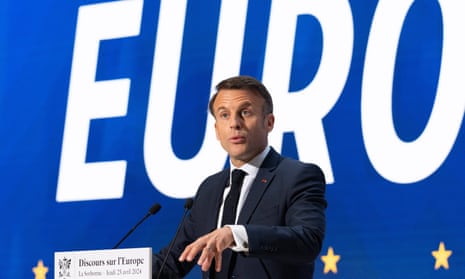[Rwanda Forum] Macron criticises Rwanda-style asylum schemes days after UK passes bill | Europe | The Guardian
Macron criticises Rwanda-style asylum schemes days after UK passes bill
Such policies are 'betrayal' of values, says French president in speech covering defence and negative effects of Brexit

Emmanuel Macron has criticised migration policies that involve sending people to African countries as "a betrayal of our [European] values", just days after the UK government passed its Rwanda deportation bill.
The French president made the remarks in a wide-ranging speech on Thursday aimed at warning Europe against overdependence on other countries for security and trade.
Turning to migration, he said he did not believe in "this model that some people want to put in place, which means that you go and look for a third country, for example in Africa, and send our immigrants there".
He added: "This is a betrayal of our values and will lead us down the path of new dependencies on third countries."
Macron did not mention Rishi Sunak's Rwanda plan directly, but did not hold back in giving his views on Brexit. Britain's departure from the EU was "an explosion whose negative effects, from what I can tell, have meant that today nobody dares to propose exits, neither from the Europe, nor from the euro".
He also described the British as "natural allies" of France and the EU, saying defence treaties, such as the Lancaster House agreements signed in 2010 with the UK, left "a solid foundation for partnerships" that had not been affected by Brexit.
Delivered in a neoclassical amphitheatre at the Sorbonne University in Paris, the speech focused heavily on defence, as Macron urged European leaders to respond to the "paradigm shift" of the invasion of Ukraine by a nuclear-armed Russia.
"The basic condition for our security is for Russia not to win," he said. "Europe needs to be able to protect what is dear to it alongside its allies … Do we need to have an anti-missile shield or anti-missile system? Maybe."
"When we have a neighbouring country that has become aggressive and seems to have no limits and that has ballistic missiles [and has] been innovating a lot when it comes to the technology and the range of these missiles, we see that we absolutely have to set up this strategic concept of credible defence."
Macron called for cooperation between European armies, "regional European defence frameworks" in the Mediterranean and Arctic, as well as a European military academy.
Europe could not be "a vassal" of the US and had to "show that it knows how to talk to all the other regions of the world", he added.
The speech was billed as a follow-up to one Macron gave at the Sorbonne in 2017, only months after he was first elected French president on a staunchly pro-European centrist platform. Then a new EU leader, Macron said Europe had become "too slow, too weak and too ineffective" and argued for a more "sovereign Europe", including a joint defence budget, common border controls and common industrial programmes to support green technology.
Now speaking as one of Europe's most powerful decision-makers, but whose influence could wane with the declining poll ratings of his centrist group, Macron argued that the "European sovereignty agenda" laid out in 2017 had been widely implemented, but threats to Europe's place in the world had become more acute. "Europe is mortal, it can die and this only depends on our choices," he said.
French officials framed the speech as Macron's contribution to the debate on the future of Europe, ahead of European elections in June and the appointment of new leaders at the helm of the EU institutions.
Referring to the US-China rivalry, Iran's nuclear ambitions and Russia's aggression, Macron spoke of an "acceleration in the world" to which the EU was failing to respond adequately. "Europe is in a situation of being cornered on all its borders and we are reacting too slowly," Macron said.
After the speech, Olaf Scholz, the German chancellor, tweeted: "France and Germany both want Europe to remain strong. Your speech offers good ideas for achieving this, @EmmanuelMacron. Together we will make progress in the EU: politically and economically. For a self-assured and innovative EU. Vive l'Europe!"
His quick response contrasts with Angela Merkel's silence following Macron's previous Sorbonne speech, which was widely seen as showing a lack of enthusiasm for his ideas.
The speech covered familiar French themes, including the importance of nuclear power in Europe's low-carbon energy mix, a less "naive" trade policy to ensure European producers were not undercut, as well as boosting production of leading-edge technology, such as AI, and of arms inside Europe.
Criticising past decisions, Macron said: "We had delegated our energy to Russia; our security, for several of our European partners, depended on the [United] States; and trade was given over to China. And now we have to get things back."
Additional reporting by Deborah Cole in Berlin
| ### "Be courteous to all, but intimate with few; and let those few be well tried before you give them your confidence", George Washington. ### |
Comments
Post a Comment